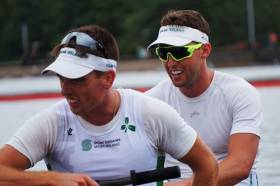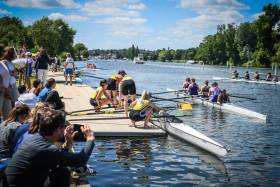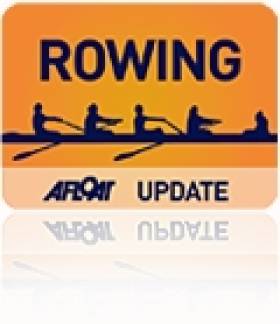Displaying items by tag: Henley Women's Regatta
UCD and Enniskillen Progress at Women's Henley
#Rowing: UCD’s eight beat Jesus College, Cambridge, to progress to the quarter-finals at Henley Women’s Regatta today. The Irish crew will take on Newcastle University at 4.44 pm.
Enniskillen’s junior 18 eight came through a time trial to qualify for their quarter-final. They will take on Wimbledon High School at 3.40 with strong hopes of moving into Sunday’s semi-final.
O'Driscoll and O'Donovan to Compete at Henley Royal Regatta
#Rowing: The standout names in the Irish entry for Henley Royal Regatta are Mark O’Donovan and Shane O’Driscoll. The world lightweight champions of 2017 have entered the Silver Goblets for open pairs.
The Irish challenge features Commercial in the Thames Cup for club eights and UCD’s four in the Visitors. Both crews are Irish champions. Enniskillen have chosen to enter quadruples in the Fawley and the Diamond Jubilee.
UCD, who compete at Henley Women’s Regatta this weekend, have entered the open event for women’s eights, the Remenham. Orla Hayes of Skibbereen has entered the Princess Royal, the open event for women's single scullers.
Henley Royal Regatta, July 3rd to 7th (Selection of Entries, Irish interest)
Remenham Cup (Women’s Eights, Open): UCD
Thames (Men’s Eight, Club): Commercial
Visitors (Men’s Four, Club and University): UCD
Prince of Wales (Men’s Quadruple, Club and University): Lagan Scullers’
Fawley (Men’s Quadruple, Junior): Enniskillen Royal Boat Club
Diamond Jubilee Cup (Women’s Quadruple, Junior): Enniskillen Royal Boat Club
Britannia (Men’s Fours, coxed, Club): Belfast Rowing Club
Silver Goblets (Men’s Pairs, Open): Mark O’Donovan and Shane O’Driscoll (Skibbereen)
Hambleden Pairs (Women’s Pairs, Open): Sadhbh O’Connor and Natalie Long (NUIG and Skibbereen)
Double Sculls (Men’s Double, Open): Nathan Hull and OJ Dix (Queen’s, Belfast and Leander)
Stonor Trophy (Women’s Double Sculls, Open): Fiona Chestnutt, CK Knight (Reading Univ and Newcastle Univ)
Diamond Sculls (Men’s Single, Open): Callum McCrae (Cambridge Univ Lightweight RC)
Princess Royal (Women’s Single, Open): Orla Hayes (Skibbereen)
#Rowing: Two NUIG crews made it through time trials on the first day of Henley Women’s Regatta and will compete on Saturday. In the Championship Eight, NUIG will take on Yale University (scheduled for 2.40), while the Development Coxed Four have been drawn to take on Aberdeen C at 2.04. Tribesmen were allowed only to compete in the time trial of the Championship Eight.
Three Irish crews made their exits: UCD’s eight, the four from Queen’s University and Cork’s Boat Club’s Championship Double. Commercial’s Championship Lightweight Pair have a bye into the semi-final and go into action first on Sunday (10.20).
Henley Women’s Regatta (Irish interest)
Friday
Championship Eight: NUIG made it through Time Trial.
Aspirational Academic Eight: Bath Univ/Bristol Univ bt UCD, 2 ½ l.
Aspirational Academic Four: Exeter Univ bt Queen’s A, nro
Development Coxed Four: NUIG made it through Time Trial.
Championship Doubles: Leander bt Cork A (C Deasy, J Rigothi) 4 ½ l.
Nixon Gives Portora Boost at Henley Women's Rowing
#ROWING: Holly Nixon brought Portora a title at Henley Women’s Regatta today. The Enniskillen woman teamed up with Lucy Burgess, Mathilda Hodgkins-Byrne and Josephine Wratten to take the Borne Cup for elite quadruple sculls with a six-length win in the final over a French composite. In the junior coxed four, Portora had given way to Henley Rowing Club (the eventual winners) and in the junior 16 coxed four American crew St Paul’s had beaten them at the quarter-final stage.
Women’s Henley (Finals; Irish interest):
Elite Quadruple Sculls: Gloucester H/Northwich/Tees/Portora bt Grenoble/Caen, D’Avignon 6l.
Trunk and Arms Single Sculls: Tribesmen (K O’Brien) bt Cantabrigian (C Connon) 3l.


























































